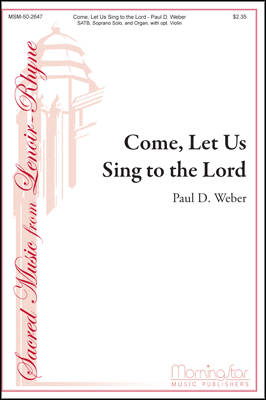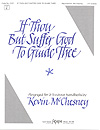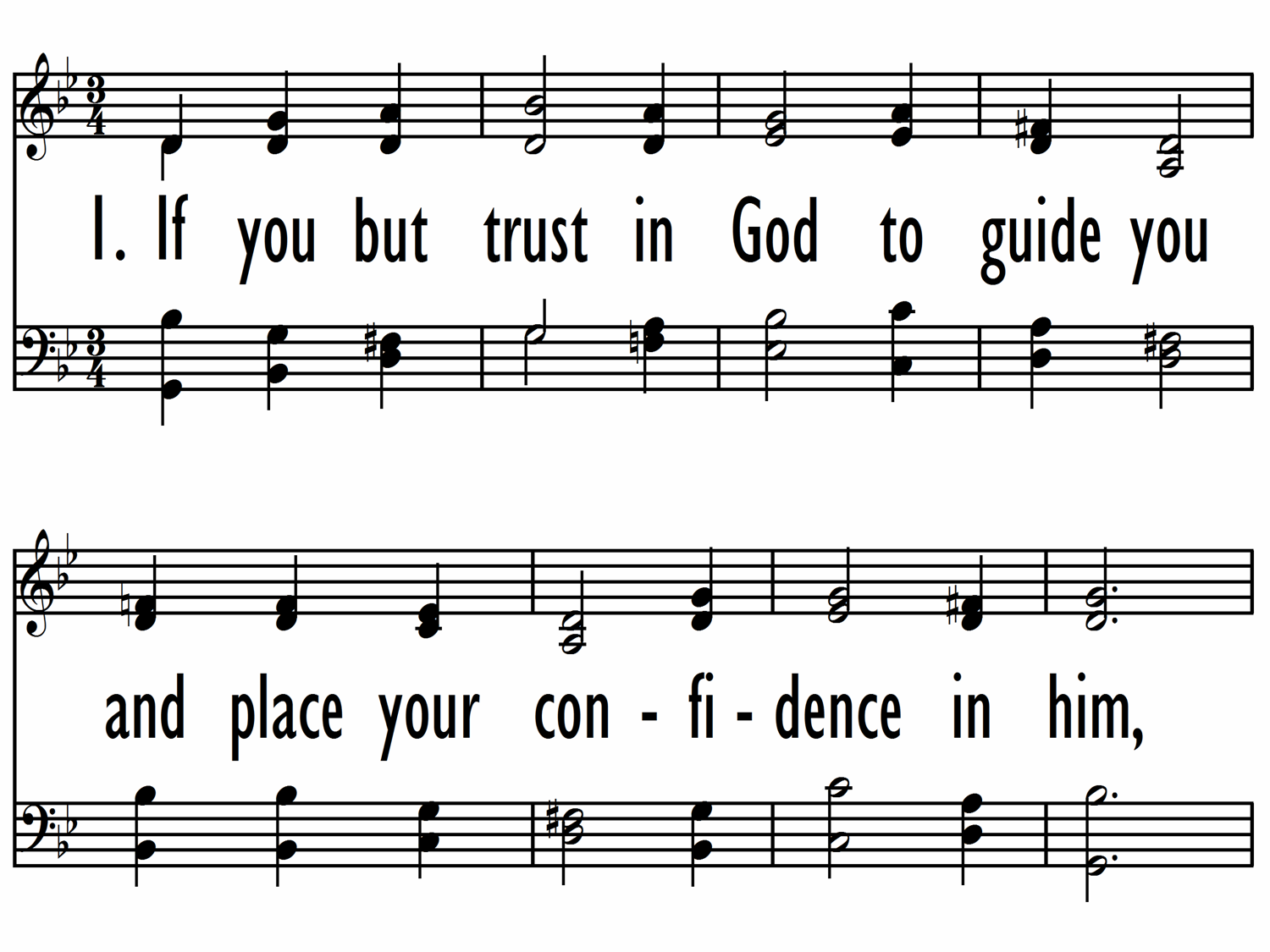- |
User Links
If Thou but Suffer God to Guide Thee

If thou but suffer God to guide thee
Author: Georg Neumark (1641); Translator: Catherine Winkworth (1855, 1863)Tune: NEUMARK
Scripture Songs
Published in 193 hymnals
Printable scores: PDF, MusicXMLPlayable presentation: Lyrics only, lyrics + musicAudio files: MIDI, Recording
Representative Text
1 If you but trust in God to guide you
and place your confidence in him,
you'll find him always there beside you
to give you hope and strength within;
for those who trust God's changeless love
build on the rock that will not move.
2 Only be still and wait his pleasure
in cheerful hope with heart content.
He fills your needs to fullest measure
with what discerning love has sent;
doubt not our inmost wants are known
to him who chose us for his own.
3 Sing, pray, and keep his ways unswerving,
offer your service faithfully,
and trust his word; though undeserving,
you'll find his promise true to be.
God never will forsake in need
the soul that trusts in him indeed.
Psalter Hymnal, (Gray), 1987
Author: Georg Neumark
 Georg Neumark (b. Langensalza, Thuringia, Germany, 1621; d. Weimar, Germany, 1681) lived during the time of the Thirty Years' War, when social and economic conditions were deplorable. He had personal trials as well. On his way to Königsberg to study at the university, traveling in the comparative safety of a group of merchants, he was robbed of nearly all his possessions. During the next two years he spent much of his time looking for employment. He finally secured a tutoring position in Kiel. When he had saved enough money, he returned to the University of Königsberg and studied there for five years. In Königsberg he again lost all his belongings, this time in a fire. Despite his personal suffering Neumark wrote many hymns in which he e… Go to person page >
Georg Neumark (b. Langensalza, Thuringia, Germany, 1621; d. Weimar, Germany, 1681) lived during the time of the Thirty Years' War, when social and economic conditions were deplorable. He had personal trials as well. On his way to Königsberg to study at the university, traveling in the comparative safety of a group of merchants, he was robbed of nearly all his possessions. During the next two years he spent much of his time looking for employment. He finally secured a tutoring position in Kiel. When he had saved enough money, he returned to the University of Königsberg and studied there for five years. In Königsberg he again lost all his belongings, this time in a fire. Despite his personal suffering Neumark wrote many hymns in which he e… Go to person page >Translator: Catherine Winkworth
 Catherine Winkworth (b. Holborn, London, England, 1827; d. Monnetier, Savoy, France, 1878) is well known for her English translations of German hymns; her translations were polished and yet remained close to the original. Educated initially by her mother, she lived with relatives in Dresden, Germany, in 1845, where she acquired her knowledge of German and interest in German hymnody. After residing near Manchester until 1862, she moved to Clifton, near Bristol. A pioneer in promoting women's rights, Winkworth put much of her energy into the encouragement of higher education for women. She translated a large number of German hymn texts from hymnals owned by a friend, Baron Bunsen. Though often altered, these translations continue to be used i… Go to person page >
Catherine Winkworth (b. Holborn, London, England, 1827; d. Monnetier, Savoy, France, 1878) is well known for her English translations of German hymns; her translations were polished and yet remained close to the original. Educated initially by her mother, she lived with relatives in Dresden, Germany, in 1845, where she acquired her knowledge of German and interest in German hymnody. After residing near Manchester until 1862, she moved to Clifton, near Bristol. A pioneer in promoting women's rights, Winkworth put much of her energy into the encouragement of higher education for women. She translated a large number of German hymn texts from hymnals owned by a friend, Baron Bunsen. Though often altered, these translations continue to be used i… Go to person page >Text Information
| First Line: | If thou but suffer God to guide thee |
| Title: | If Thou but Suffer God to Guide Thee |
| German Title: | Wer nur den lieben Gott läßt walten |
| Author: | Georg Neumark (1641) |
| Translator: | Catherine Winkworth (1855, 1863) |
| Meter: | 9.8.9.8.8.8 |
| Language: | English |
| Copyright: | Public Domain |
| Liturgical Use: | Scripture Songs |
| Article: | "If Thou but Suffer God to Guide Thee": The Journey of a Lutheran Hymn by Lawrence L. Lohr (from "The Hymn") |
- (hymns)
- (hymns)
- (hymns)
- (hymns)
- (hymns)
- (hymns)
- (hymns)
- (hymns)
- (hymns)
- (hymns)
- (hymns)
- (hymns)
- (hymns)
- (hymns)
- (hymns)
- (hymns)
- (hymns)
- (hymns)
- (hymns)
- (hymns)
- (hymns)
- (hymns)
- (hymns)
- (hymns)
- (hymns)
- (hymns)
- (hymns)
- (hymns)
- (hymns)
- (hymns)
- (hymns)
- (hymns)
- (hymns)
- (hymns)
- (hymns)
- (hymns)
- (hymns)
- (hymns)
- (hymns)
- (hymns)
- (hymns)
- (hymns)
- (hymns)
- (hymns)
- (hymns)
- (hymns)
- (hymns)
- (hymns)
- (hymns)
- Year A, Christmas season, New Year's Day
This is recommended for Year A, Christmas season, New Year's Day by 2 hymnal lectionary indexes including Glory to God: the Presbyterian Hymnal #816. - Year A, Lent, Second Sunday
This is recommended for Year A, Lent, Second Sunday by 2 hymnal lectionary indexes including Lift Up Your Hearts: psalms, hymns, and spiritual songs #407. - Year A, Lent, Fourth Sunday
This is recommended for Year A, Lent, Fourth Sunday by 2 hymnal lectionary indexes including Glory to God: the Presbyterian Hymnal #816 and Lift Up Your Hearts: psalms, hymns, and spiritual songs #407. - Year A, Ordinary Time, Proper 13 (18)
This is recommended for Year A, Ordinary Time, Proper 13 (18) by 2 hymnal lectionary indexes including Glory to God: the Presbyterian Hymnal #816. - Year B, Christmas season, New Year's Day
This is recommended for Year B, Christmas season, New Year's Day by 2 hymnal lectionary indexes including Glory to God: the Presbyterian Hymnal #816. - Year B, Ordinary Time, Proper 18 (23)
This is recommended for Year B, Ordinary Time, Proper 18 (23) by 2 hymnal lectionary indexes. - Year B, Ordinary Time, Proper 25 (30)
This is recommended for Year B, Ordinary Time, Proper 25 (30) by 2 hymnal lectionary indexes. - Year B, Ordinary Time, Proper 26 (31)
This is recommended for Year B, Ordinary Time, Proper 26 (31) by 3 hymnal lectionary indexes including Lift Up Your Hearts: psalms, hymns, and spiritual songs #407. - Year C, Christmas season, New Year's Day
This is recommended for Year C, Christmas season, New Year's Day by 2 hymnal lectionary indexes including Glory to God: the Presbyterian Hymnal #816. - Year C, Epiphany season, Sixth Sunday
This is recommended for Year C, Epiphany season, Sixth Sunday by 3 hymnal lectionary indexes including Glory to God: the Presbyterian Hymnal #816 and Lift Up Your Hearts: psalms, hymns, and spiritual songs #407. - Year C, Lent, Second Sunday
This is recommended for Year C, Lent, Second Sunday by 2 hymnal lectionary indexes including Lift Up Your Hearts: psalms, hymns, and spiritual songs #407. - Year C, Lent, Third Sunday
This is recommended for Year C, Lent, Third Sunday by 2 hymnal lectionary indexes including Glory to God: the Presbyterian Hymnal #816 and Lift Up Your Hearts: psalms, hymns, and spiritual songs #407. - Year C, Ordinary Time, Proper 11 (16)
This is recommended for Year C, Ordinary Time, Proper 11 (16) by 2 hymnal lectionary indexes including Lift Up Your Hearts: psalms, hymns, and spiritual songs #407. - Year C, Ordinary Time, Proper 29 (34)
This is recommended for Year C, Ordinary Time, Proper 29 (34) by 2 hymnal lectionary indexes.
English
- 50 Uncommon Songs: for partakers of the common salvation #15
- A Book of Chorales: And supplemental hymns #56
- A Calendar of Hymns #d26
- A New Hymnal for Colleges and Schools #481
- Ambassador Hymnal: for Lutheran worship #574
- American Lutheran Hymnal #285
- Association Hymn Book #d84
- Association Hymn Book: for use in meetings for men #193
- Australian Hymn Book #459
- Baptist Hymnal (1975 ed) #203 10 shown out of 136
French
German
Spanish
Notes
Scripture References:
all st. = Ps. 55:22, Ps. 56:11, Prov. 3:5-6
Georg Neumark (b. Langensalza, Thuringia, Germany, 1621; d. Weimar, Germany, 1681) lived during the time of the Thirty Years' War, when social and economic conditions were deplorable. He had personal trials as well. On his way to Konigsberg to study at the university, traveling in the comparative safety of a group of merchants, he was robbed of nearly all his possessions. During the next two years he spent much of his time looking for employment. He finally secured a tutoring position in Kiel. When he had saved enough money, he returned to the University of Konigsberg and studied there for five years. In Konigsberg he again lost all his belongings, this time in a fire. Despite his personal suffering Neumark wrote many hymns in which he expressed his absolute trust in God. In 1651 he settled in Weimar, Thuringia, where he became court poet and archivist to Duke Johann Ernst and librarian and registrar of the city. Neumark wrote thirty-four hymns, of which "If You But Trust in God to Guide You" has become a classic.
Neumark wrote this text at age twenty, just after he had finally been able to find employment as a tutor for a judge in Kiel. Neumark was so relieved and grateful to God by his change in circumstance that he wrote this text, saying, “This good fortune, which came so suddenly and, as it were, from heaven, so rejoiced my heart that I wrote my hymn 'Wer nur . . .' to the glory of my God on that first day.”
Written in Kiel, Germany, in 1641, the seven-stanza text (“Wer nur den lieben Gott lasst walten”) had the following heading: "a hymn of consolation, that God will care for and preserve his own in his own time; after the saying 'cast thy burden upon the Lord and He shall sustain thee.' Psalm 55:22." The text was published with the tune, also composed by Neumark, in Fortgepflanzter Musikalisch-Poetischer Lustwald (1657).
Catherine Winkworth (PHH 194) prepared two translations of the original German text: one published in her Lyra Germanica (1855) and one published with substantial revision in her Chorale Book for England (1863), in which the first stanza began "If thou but suffer God to guide thee." Winkworth's revised translation of Neumark's original Stanzas 1, 3, and 7 is the basis for the three stanzas found in the Psalter Hymnal.
A classic German chorale, this fine text focuses on trust in God's care in all of life's circumstances, both prosperous times and "evil days." As Christians we are counseled to be confident (st. 1), to have patience (st. 2), and to be faithful in service (st. 3).
Liturgical Use:
Many occasions in Christian worship when profound trust and hope in God's providence and faithfulness needs to be affirmed as only song can express it.
--Psalter Hymnal Handbook
Access an additional article on the Canterbury Dictionary of Hymnology:
Tune
NEUMARKPublished in 1657 (see above) WER NUR DEN LIEBEN GOTT is also known as NEUMARK. Johann S. Bach (PHH 7) used the tune in its isorhythmic shape (all equal rhythms) in his cantatas 21, 27, 84, 88, 93, 166, 179, and 197. Many Lutheran composers have also written organ preludes on this tune. WER NUR DEN…
For Leaders
Text:
Neumark’s original German text, written in 1641, consisted of seven verses. In 1855, Catherine Winkworth translated the text into English, and in 1863 drastically revised her translation, the first line now reading, “If thou but suffer God to guide thee.” Her revisions of the original stanzas one, three, and seven are found in most modern hymnals. Changes in word choice abound between hymnals, but despite different wording, the different texts all ultimately say the same thing. For example, in the Psalter Hymnal, the third stanza reads, “Sing, pray and keep his ways unswerving, offer your service faithfully...” compared to the same line in the Presbyterian Hymnal, which reads, “Sing, pray, and swerve not from God’s ways, but do thine own part faithfully.” Other changes between hymnals amount to changing “thy” and “thine” and other antiquated language to a more modern text.
Tune:
The tune WER NUR DEN LIEBEN GOTT (same name as original German hymn) was composed by Neumark in 1657 to accompany his text. This became a very popular tune, used in organ variations by Lutheran composers, and in a number of Bach’s cantatas. This is a rather interesting tune because, as Paul Westermeyer states, it can be sung at a number of different tempos, and the meaning of the text will change depending on the speed. For example, you would sing the hymn at a faster tempo when celebrating God’s faithfulness, and at a much slower tempo when singing it in a time of crisis or hardship. The words stay the same, but the meaning changes quite drastically depending on how fast you sing those words. For example, Madeline Robison's slower version in a minor key speaks of heartache much more than Bach's Orgel Buchlein, BWV 607.
When/Why/How:
Throughout the year we have reasons to remind ourselves to rely on God alone for our help and our safety. This hymn is thus appropriate at any time during the liturgical calendar, but especially during times of crisis in your church or when you need a reminder of God’s faithfulness. It can also be very powerful in services of celebration in which you remember and re-tell the stories of how God has been faithful to you and your church.
Suggested music:
- Phillips, Craig. O Love, How Deep: Three Hymn Settings for Organ
- Wondrous Grace (Hymns, Spirituals and Classices for Lent and Holy Week) - for Piano
- Cherwien, David. If You But Trust in God to Guide You for Choir, Congregation, Organ, Bass, Cello, and Flute
- Woodward, James. If YOu But Trust in God for Choir
Laura de Jong, Hymnary.org
Timeline
Arrangements
Media
Psalter Hymnal (Gray) #446
Small Church Music #7024
- PDF Score (PDF)
- MIDI file from Baptist Hymnal 1991 #57
- Audio recording from Baptist Hymnal 1991 #57
- MIDI file from The Cyber Hymnal #2786
- Audio recording from Evangelical Lutheran Worship #769
- MIDI file from Gloria Deo: a Collection of Hymns and Tunes for Public Worship in all Departments of the Church #423
- Audio recording from Glory to God: the Presbyterian Hymnal #816
- Audio recording from Lift Up Your Hearts: psalms, hymns, and spiritual songs #407
- Audio recording from Lift Up Your Hearts: psalms, hymns, and spiritual songs #407
- Audio recording from Lift Up Your Hearts: psalms, hymns, and spiritual songs #407
- Audio recording from Psalter Hymnal (Gray) #446
- MIDI file from Psalter Hymnal (Gray) #446
- MIDI file from Psalter Hymnal (Gray) #446
- Audio recording from Small Church Music #7024
- Audio recording from Small Church Music #7024
- MIDI file from The United Methodist Hymnal #142
- Audio recording from The United Methodist Hymnal #142


 My Starred Hymns
My Starred Hymns







